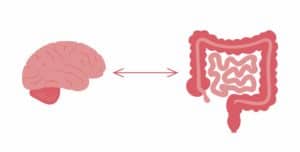Have you felt butterflies in your stomach when you were happy? Or have you ever felt like ‘your stomach is in a knot? We have all used these words in some situations. Have you ever thought about why we use these terms? The reason behind this feeling is our digestive system. Emotions such as anger, anxiety, sadness, and excitement could trigger symptoms in the gut. It’s easy to say that our digestive tract is sensitive to mood changes. Well, the gut brain connection is real! Gut health and mental health have a bidirectional relationship to be more accurate.
The brain has a direct impact on the digestive system. For example, as soon as we do not eat but think about eating, gastric juices begin to be secreted. Similarly, the gut sends signals to the brain, just as the brain sends signals to the gut. So, a problem in your gastrointestinal tract can be the cause of anxiety, stress, or depression you may experience. Because the brain and digestive system are interconnected. You may have heard that our gut is our ‘second brain.’ So our two brains are constantly interacting, but how? Let’s take a closer look at the gut brain connection.
How gut flora affects the neurochemical release
The microbiome concept has been defined as an ecological collection of common, symbiotic, and pathogenic microorganisms that share our body space. The human microbiota is formed by the combination of bacteria and other organisms living in our body. In humans and animals, the microbiota begins as a dynamic ecosystem and stabilizes during the first 2-3 years after birth.
The diversity and richness of microbial composition continue to increase throughout life. It has also been shown that these microorganisms play an essential role in digestion, metabolism, and the immune system. The composition and number of microbiota are determined by various factors such as host genetics, mode of birth, the lifestyle of the individual, age, ethnic origin, the incidence of diseases, antibiotic use, and stress.
Changes in microbiota content have been reported in many diseases such as inflammatory bowel disease, atherosclerosis, diabetes mellitus, non-alcoholic fatty liver disease, metabolic syndrome, and immunodeficiency.
The Gut Brain Connection: The enteric nervous system and central nervous system
The brain and gut are connected in various ways, including the enteric nervous system, the vagus nerve, the immune system, or the metabolic processes of intestinal microorganisms. Our gut microbiota plays a vital role in our physical and psychological health with its own neural network. This network that we describe as ‘the gut brain connection’ is called the enteric nervous system (ENS), a complex system of about 100 million nerves in the intestinal wall.
The ENS is sometimes called the ‘second brain’ and arises from the same tissue as the CNS during embryonic development. The gut microbiota composition is associated with gut homeostasis, protection against pathogens, and appropriate immune response. Many environmental factors affect the gut microbiota. Geography, life cycle, mode of birth, infant feeding, stress, exercise, hygiene, infections, medications, and nutrition are some of these environmental factors. Unfortunately, modern diet and lifestyle changes have increased cardiovascular diseases, cancer, metabolic and allergic diseases.
ENS can control the function of multiple organs of the body, such as the vagus nerve, heart rate, and bowel movement. The vagus nerve can transmit immune signals to the CNS. Vagus signaling from the gut can trigger an anti-inflammatory response to sepsis triggered by microorganisms. Intestinal microorganisms can affect brain function via the vagus nerve. Since intestinal microorganisms can directly affect the immune system, immune activation may be a way to transmit microbial effects to the CNS.
They are immune cells in the CNS, and studies have found that the metabolism of intestinal microorganisms can regulate its maturation and function, thereby affecting CNS function. Also; Microorganisms can cause neurophysiological changes in the host by producing chemicals that bind to receptors inside and outside the gut. These neurochemical changes include neuroinflammation, increased oxidative stress, and depletion of antioxidants, thus causing mitochondria dysfunction. Other neurotransmitters like serotonin, melatonin, histamine, and acetylcholine also have a role in the microbiota-gut-brain axis.
Explaining the serotonin release in the gut
Most of us have been commonly coming across the serotonin hormone and its function. So, to define it briefly, what is serotonin? Serotonin is an important chemical that helps different parts of the brain communicate with each other. For this reason, low or high serotonin levels have a direct effect on conditions such as depression, anxiety, and pain sensitivity.
Because serotonin directly affects our mental health, it was thought for many years to be a hormone secreted in the brain. But scientific research in recent years has revealed that approximately 5% of this vital chemical is found in the brain. In contrast, the rest is located in the intestinal mucosa and blood cells.
When you think of unhappiness or depression, the first thing that naturally comes to mind is the lack of serotonin, known as the happiness hormone. While the brain secretes about 5% of serotonin, the rest is primarily beneficial bacteria in the intestines. This critical information reveals that intestinal health is vital not only for your physical health but also for your mental health. Therefore, we need to protect gut health for our physical and psychological health. A healthy diet is essential for a healthy mind!
Summarizing the gut brain connection
The gut brain connection includes a strong two-way communication between the brain and the gut, thanks to neural connections and hormones. Any change in this axis may cause disturbances in this bidirectional system. The effects of the intestinal microbiota on the development of the immune system, brain, nervous system, and the shaping of behaviors have been revealed in recent studies.
Some diseases also lead to changes in the gut microbiota. Clinical studies reveal that there is a solid and practical connection between the brain and the gut. In these studies, it has been reported that changes that occur in the intestinal microbiota may cause changes in the metabolism, immunity, and hormonal system, which may lead to the development of many diseases such as cancer, obesity, various intestinal disorders, depression, panic attacks, anxiety, Parkinson’s, and Alzheimer’s.
If you’re looking to build new habits and enhance your health, then it’s time to start thinking about what you should be doing differently in your life. The good news is that there are many ways to make changes to your lifestyle that can improve your health and lead to better overall wellness. If you want to learn how to live a healthier lifestyle, download wannawell app for free.




Recent Comments